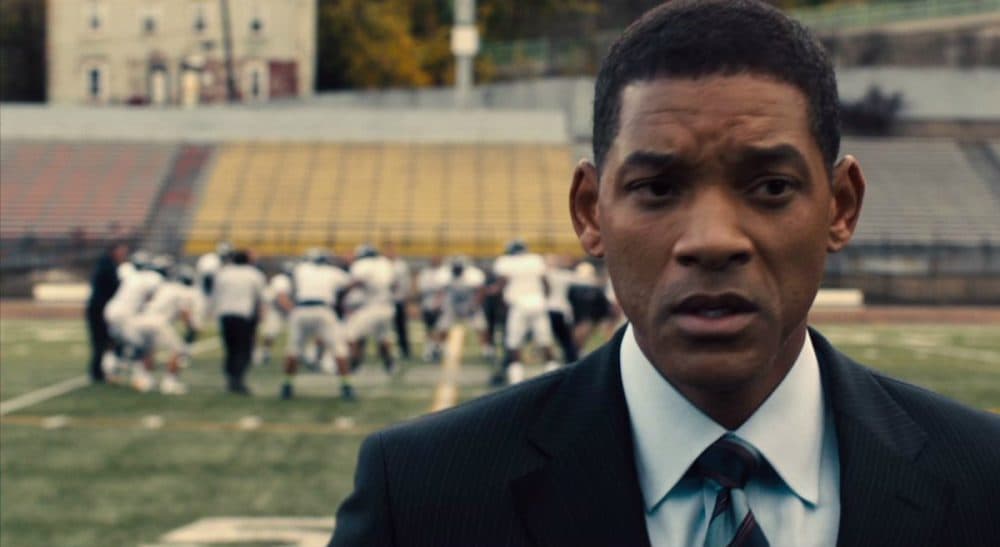Advertisement
A Risk Worth Taking? In Spite Of 'Concussion,' Football Remains Vital As Ever

Some thought “Concussion,” the movie, just might kill football. Shocked by what they saw onscreen, parents would stop their children from playing the game, drying up the pool of talent upon which colleges and the pros depend. Insurance companies, frightened by the liability, would refuse to cover football programs in high school and college, meaning the schools were now exposed to devastating lawsuits. Politicians would mobilize, pushing for bans or debilitating restrictions. Fans, upset by the brutality of a game that robs players of their minds and lives, would turn their attention elsewhere. Eventually, the game that overtook baseball as America’s pastime would fade away.
All possible, but all unlikely. We’re now in the midst of the National Football League playoffs and the hype, it seems, has never been greater. Millions will watch the playoffs, the Super Bowl next month will undoubtedly be the most-viewed event of the year, advertisers will pay stunningly high rates for precious seconds of air time, and “Concussion” will be little more than an afterthought. If this is death, it is a most pleasant one indeed.
For a film that generated so much advance press, 'Concussion' landed with a thud.
So what happened? Some might point darkly to conspiracy and the power of the NFL. Sony Pictures, the New York Times claimed last September, tempered much of the movie to appease the league (a report that director Peter Landesman flatly denied). Others might blame America’s supposed culture of violence, linking football to, say, our fascination with guns.
Or maybe it’s just because the movie wasn’t all that good and didn’t have much to say.
For a film that generated so much advance press, “Concussion” landed with a thud. Released on Christmas Day, it’s already about to exit theaters. Total box office to date has been just $27 million. With a production budget of $35 million, it seems sure to be a loser. The NFL is doubtless thrilled, but really it’s the movie’s own fault.
Granted, Will Smith does well in his performance as Dr. Bennet Omalu, the Pittsburgh pathologist who in 2005 published research on what he called Chronic Traumatic Encephalopathy or CTE. But the story itself is tepid. The movie drags, despite some obviously fictionalized efforts to make it much more dramatic than the real-life incidents that were its inspiration. (Most egregiously, the film suggests that the NFL somehow got the federal government to level corruption charges against Omalu’s boss in retaliation for Omalu’s work. As Slate columnist Daniel Engber has written, that’s untrue; indeed, the charges were brought before Omalu even wrote about CTE.)
https://www.youtube.com/watch?v=Io6hPdC41RM
But the core problem is that the movie itself is kind of weak-kneed. No question, Omalu was pioneering in revealing the damage being suffered by football players. But the point of the film isn’t that this damage is so horrific that everyone should stop playing football. Rather, Omalu is upset, apparently, because brain damage was a risk players didn’t know about. “Tell the truth!” Will Smith says at one dramatic point in the film.
And so we see at the movie’s end that, after years spent denying the problem, the NFL finally relented and did tell the truth. It settled a class action lawsuit with players that provided for significant compensation for veterans who develop brain-related medical conditions. It started to change rules and play practices to reduce the chances of brain damage, including tighter restrictions on hits to the head and shoulders and independent spotters who can stop play if there appears to be an on-field concussion. And it agreed to fund research into sports-related head injuries. There are problems with all of these: players can still use their helmets as weapons and just suffer the penalty, the spotters can’t actually pull players from the game, and there are allegations the NFL has refused to fund researchers it views as hostile. Still, it seems clear that the league is finally seeing that it needs to address the problem head on (so to speak) rather than ignoring it.
So now that we know “the truth,” what happens?
There’s been some fretting that the concussion stories would cause player participation to decline. A 2014 Bloomberg poll, for example, found that 50 percent of parents would not want their sons to play. That was bolstered by a report from Pop Warner that participation in its programs dropped 9.5 percent between 2010 and 2012.
A prediction ... football at all levels will emerge from its crisis as strong as ever. Concussions and long-term brain damage will be seen as a risk, but an acceptable risk, a risk worth taking.
I’d take all of that with a grain of salt. Yes, participation in football may be declining, but as it turns out, participation by children in almost all sports is declining. Some of that is because parents are objecting to what they see as an overemphasis on sports versus everything else. Some doubtless is also due to the coach potato-fication of America; kids would rather sit and play video games.
A prediction: In the years ahead, the sport will make additional rule changes to improve safety, coaches and staff will become more aware of potentially damaging hits, and leagues for younger kids, in particular, will try to reduce the amount of physical contact. But football at all levels will emerge from its crisis as strong as ever. Concussions and long-term brain damage will be seen as a risk, but an acceptable risk, a risk worth taking.
Why so? In the movie, the recalcitrance of the NFL in admitting its concussion problem is likened to that of tobacco companies refusing to acknowledge the harms of smoking. Stick with that comparison for a moment. Despite all of the well-documented harms of tobacco, 40 million adults still smoke. And they take that risk for little in return. But football? Players are the heroes of their schools, beneficiaries of hefty scholarships and — at the pro level -- make princely salaries (averaging $2.1 million). If someone offered you $1 million to smoke a pack a day for a year, would you do it? Likely yes. And for the same reason, risks notwithstanding, boys and men will continue to clamor for gridiron glory.
